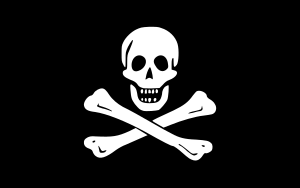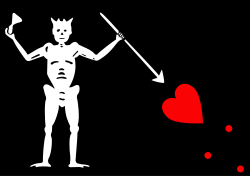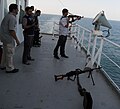Portal:Piracy
Introduction

Piracy is an act of robbery or criminal violence by ship or boat-borne attackers upon another ship or a coastal area, typically with the goal of stealing cargo and other valuable goods. Those who conduct acts of piracy are called pirates, and vessels used for piracy are called pirate ships. The earliest documented instances of piracy were in the 14th century BC, when the Sea Peoples, a group of ocean raiders, attacked the ships of the Aegean and Mediterranean civilisations. Narrow channels which funnel shipping into predictable routes have long created opportunities for piracy, as well as for privateering and commerce raiding.
Historic examples of such areas include the waters of Gibraltar, the Strait of Malacca, Madagascar, the Gulf of Aden, and the English Channel, whose geographic structures facilitated pirate attacks. The term piracy generally refers to maritime piracy, although the term has been generalized to refer to acts committed on land, in the air, on computer networks, and (in science fiction) outer space. Piracy usually excludes crimes committed by the perpetrator on their own vessel (e.g. theft), as well as privateering, which implies authorization by a state government.
Piracy or pirating is the name of a specific crime under customary international law and also the name of a number of crimes under the municipal law of a number of states. In the 21st century, seaborne piracy against transport vessels remains a significant issue, with estimated worldwide losses of US$25 billion in 2023, increased from US$16 billion per year in 2004. (Full article...)
Selected biography -
Captain Samuel Bellamy (c. 23 February 1689 – 26 April 1717), later known as "Black Sam" Bellamy, was an English sailor turned pirate during the early 18th century. He is best known as the wealthiest pirate in recorded history, and one of the faces of the Golden Age of Piracy. Though his known career as a pirate captain lasted little more than a year, he and his crew captured at least 53 ships.
Called "Black Sam" in Cape Cod folklore because he eschewed the fashionable powdered wig in favor of tying back his long black hair with a simple band, Bellamy became known for his mercy and generosity toward those he captured on his raids. This reputation earned him another nickname, the "Prince of Pirates". He likened himself to Robin Hood, with his crew calling themselves "Robin Hood's Men". (Full article...)Selected article -
Piracy kidnappings occur during piracy, when people are kidnapped by pirates or taken hostage. Article 1 of the United Nations International Convention against the Taking of Hostages defines a hostage-taker as "any person who seizes or detains and threatens to kill, to injure, or to continue to detain another person (hereinafter referred to as the 'hostage') in order to compel a third party namely, a State, an international intergovernmental organization, a natural or Juridical person, or a group of people, to do or abstain from doing any act as an explicit or implicit condition tor the release of the hostage commits the offense of taking of hostages ("hostage-taking") within the meaning of this convention." Kidnappers often try to obtain the largest financial reward possible in exchange for hostages, but piracy kidnappings can also be politically motivated.
The coast of Somalia has been a piracy hot spot since the late 1990s, threatening state security and global trade. During the early 2000s, the international community established multilateral anti-piracy initiatives such as the Combined Task Force 150; in 2008, the United Nations Security Council (UNSC) enacted Resolution 1816 to combat piracy in the Somali region. The number of incidents decreased in that region after the international initiatives, but increased in West Africa (especially in the Gulf of Guinea). In 2020, during the COVID-19 pandemic, the International Maritime Bureau (IMB) saw an increase in kidnappings in the Gulf of Guinea; 95 percent of all kidnappings of crew members of hijacked vessels took place in the gulf. (Full article...)Did you know?
- ... that the developers of Hotline Miami 2: Wrong Number suggested that Australian customers pirate their game?
- ... that since 1904 the Gasparilla Pirate Festival in Tampa, Florida, has featured a pirate-themed parade?
- ... that indigenous Australian artist Daniel Boyd has depicted colonial figures including Captain James Cook and Governor Arthur Phillip as pirates?
- ... that HMS Redpole, one of the aptly-named coffin brigs, sank in an action with a pirate vessel in August 1828?
- ... that Saudi Arabian broadcaster beoutQ pirated and resold beIN Sports programmes during the Qatar diplomatic crisis?
- ... that red Jolly Roger flags were the most feared of all; all prayed they never encountered the "Bloody Red," which boldly declared that no mercy would be shown and all victims would be killed?
- ... that, while it is unknown if pirates actually kept parrots as pets, it is thought that at least some captains kept cats aboard to keep populations of rats and other vermin down?
- ... that in 2011, pirates were reported as raiding along the Danube River in the center of Europe?
Selected quotations
| “ | I am sorry to see you here Jack, but if you had fought like a man, you need not be hanged like a dog. | ” |
| — Anne Bonny | ||
General images
Selected Jolly Roger

Subcategories
Topics
WikiProjects
Related portals
Things you can do

Contribute
- Work on piracy and pirate articles and help improve them to featured articles.
Expand
Join
WikiProject Piracy Requests
- eliminate red links from List of pirates
- expand Timeline of piracy, specifically to fill in vast gap between the 1890s to 2000s
- revise Bartholomew Roberts
- help with Requested articles and Expand articles
- help with Portal:Piracy
- Create Modern Piracy
Associated Wikimedia
The following Wikimedia Foundation sister projects provide more on this subject:
-
Commons
Free media repository -
Wikibooks
Free textbooks and manuals -
Wikidata
Free knowledge base -
Wikinews
Free-content news -
Wikiquote
Collection of quotations -
Wikisource
Free-content library -
Wikiversity
Free learning tools -
Wiktionary
Dictionary and thesaurus









































































































